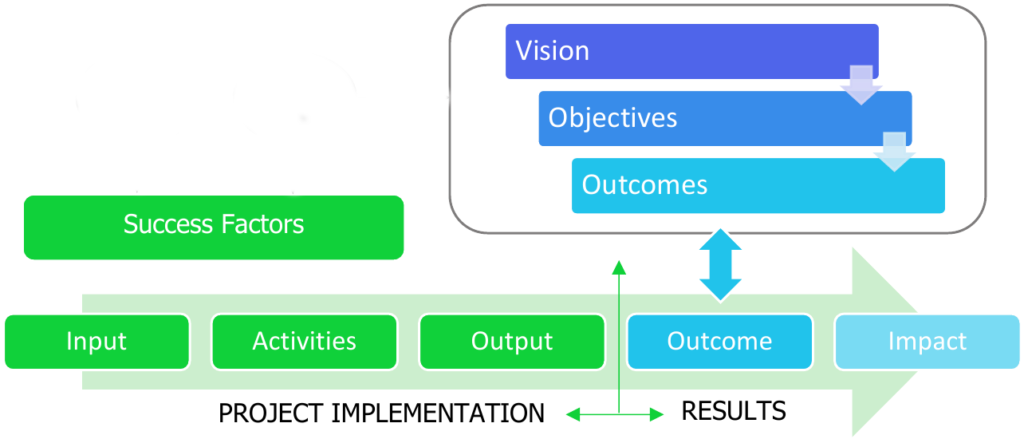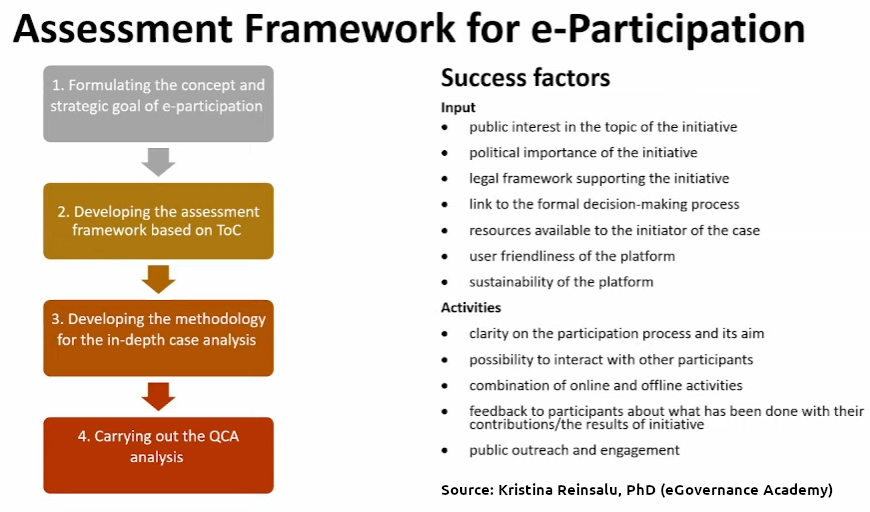The assessment framework for e-participation (AFeP) is aimed to support a result-oriented implementation of e-participation for democratic governance in digital society. The framework, developed as a part of the Co-Deciding Europe project can be used as a theoretical platform for the elaboration of success criteria and success factors, for comparative assessment of e-participation initiatives, as well as for the designing and monitoring of e-participation projects. It could also serve as a tool for knowledge sharing and capacity building to enhance the effectiveness and impact of e-participation initiatives.
Concept of e-participation
Considering the main objectives, focus and planned activities of the Co-Deciding Europe project the following three main general objectives of e-participation were defined:
- Advancement of representative democracy through participatory and deliberative democracy.
- Supporting equal rights of citizens to participate in policy making, enhancing participation to citizens beyond the typical stakeholders.
- Principle of active citizenship – citizens are not passive agents but active stakeholders of the political process.
The commonly agreed definition of e-participation in Co-Deciding Europe project, which captures the principles listed above, was formulated as follows:
e-Participation is the process of involving and enabling citizens to participate in the political decision-making process, through ICT, to make it more inclusive, participatory, and deliberative.
According to the definition, the strategic goal of e-participation is to empower citizens and to ensure that public policymaking takes place in partnership between citizens and government.
Subcategories of e-Participation
In order to implement e-participation as widely as possible, it is useful to assume that it can be implemented at all stages of the policy cycle. Combining the stages of the policy cycle with different levels of citizen-government interaction forms the following subcategories of e-Participation:
- e-CONSULTATION/POLICY DEVELOPMENT – two-way communication initiated by the Government (public authority) allowing citizens to contribute their opinions on specific issues publicly and privately. (It is good practice by the Government to also publish the feedback on the results of the consultation).
- e-COLLABORATION/AGENDA SETTING – advanced communication using a platform where citizens can discuss and propose policy issues to the Government for further discussion. The responsibility for the concluding decision lies with the Government. Collaboration may be initiated by the Government or by citizens.
- e-COLLABORATION/POLICY DEVELOPMENT – advanced communication using a platform that allows citizens to take an active part in policymaking. Collaboration may be initiated by the Government or by citizens.
- e-EMPOWERMENT/AGENDA SETTING – using a platform that facilitates citizens to initiate and conclude legally regulated agenda setting processes directed to the Government (e-Petition platforms).
- e-EMPOWERMENT/ DECISION MAKING – using a platform that facilitates citizens to carry out the decision-making process delegated to them by the Government/ Public Authority (e.g. Participatory Budgeting).
How can we define the success of an e-participation project?
To assess the results of e-participation initiatives and compare them, it is necessary to agree on the criteria for success. Different initiatives may have different aims, specific outcomes, and success criteria, but to compare them, common success criteria are needed.
The assessment framework for e-participation is based on the methodology of Theory of Change which makes it possible to assess whether the implemented projects are successful in terms of a strategic vision of the situation to be achieved using e-participation. By comparing the results of the analysed projects, it is possible to find out which factors contribute to the success or failure of the projects.
The classical Generic Input–Activities–Output–Outcome–Impact Model is also relevant for analysing e-participation projects/initiatives. According to this model, a clear distinction can be made between success factors and success criteria as shown in the Figure 1.

Success factors
Input includes the general conditions affecting the e-participation initiative and resources needed to accomplish the process. For the Input the following conditions (factors) are documented in different studies to contribute to the success of the initiative:
- public interest in the topic of the initiative
- political importance of the initiative
- legal framework supporting the initiative
- link to the formal decision-making process
- resources available to the initiator of the case
- user friendliness of the platform
- sustainability of the platform
Activities are the actions taken on the e-platform and outside the platform to achieve the aim of the initiative. Activities represent the actual implementation of the e-participation project. The principal difference from the traditional forms of citizen engagement is the use of e-platforms and channels to carry out the project. Depending on the type of initiative different e-platforms and activities could be envisaged. From published analysis of success factors of e-participation the following conditions are found to have positive effect:
- user friendliness of the platform
- clarity on the participation process and its aim
- possibility to interact with other participants
- combination of online and offline activities
- feedback to participants about what has been done with their contributions/the results of initiative
- public outreach and engagement
Success criteria
The success criteria, output, outcome, and impact, characterize the results of the e- participation initiative on different levels.
Output consists of immediate, direct and tangible results of the e-participation initiative.
- organizers (incl. public authorities) are satisfied of the case results, they gained valuable input for their work, and they are motivated to use the platform for additional cases
- participants are satisfied, they acquired new knowledge and skills
Outcome is the short- or medium-term effect of the e-participation initiative in terms of democracy (benefits for citizens, better policies, increased public awareness, etc.).
- citizens are more motivated to use e-participation for taking part in the decision-making process
- administrative skills/motivation was improved to use e-participation for citizen engagement in the decision-making process
Impact is generally characterizing long-term effects of the e-participation initiative on democratic processes in the society.
- noticeable direct impact on political decision-making
- public authorities ́ readiness to innovate e-platforms and administrative processes that support e-participation
Assessing the outcome of the e-participation initiative is particularly important, as it is directly related to desired outcomes of the Theory of Change. The level of output could be excluded from the comparative analysis since it does not directly reflect the public value of the initiative. It is also difficult to assess the strategic impact of any individual initiative; in case the immediate impact is detected (for example, the direct effect on decision making), it could be considered as an outcome of the project.
Based on success criteria discussed above, the desired outcome of e-participation initiatives
could be characterized as follows:
- participants are satisfied, they acquired new knowledge and skills
- public authorities are satisfied, they gained valuable input for their work
- the case has had direct effect on political decision-making.
According to the chosen interpretation, any case would be assessed as successful if the result would be assessed as positive in least for one of the success criteria.
Concluding remarks
It must be noted, however, that our main aim was to provide a theoretical framework and a helpful aid which enables any initiator (be it from the public sector or a civil society organization) to envision and plan e-participation initiatives or/and assess their success and impact, so this is not a tool which enables an automated quality-check of e-participation cases. The framework helps the user to ask the important questions, but it does not give necessarily easy and simple answers. Applying this framework requires the user’s additional effort to set clearly measurable goals and assess them respectively.
The assessment framework for e-participation was elaborated in the framework of Code Europe Project WP3 partner organizations: European Citizen Action Service (ECAS), Belgium; Institute for Electronic Participation, Slovenia; Centre for Public Policy PROVIDUS, Latvia; Centre for Social Sciences, Hungary; Citizens Foundation Iceland and e-Governance Academy, Estonia. The process was led and the AFeP was compiled by the e-Governance Academy expert team.
Assessment Framework for e-Participation is available at https://codecidingeurope.eu/e-participation-assessment-framework/.
Project “Co-Deciding Europe: Civic Tech for Good Governance and Active Citizenship!” (https://codecidingeurope.eu/) aimed to empower citizens to co-create policies with decision makers through Crowdsourcing.

This project benefited from a grant from Iceland, Liechtenstein and Norway through the EEA and Norway Grants Fund for Regional Cooperation.


